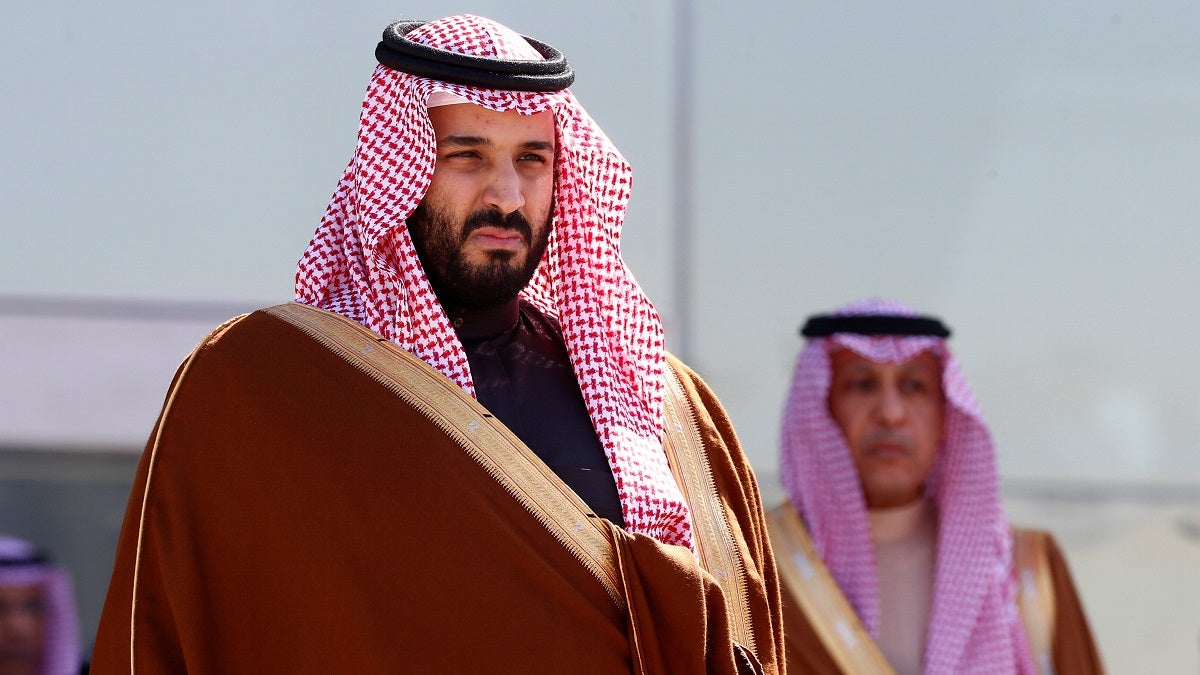
Saudi Deputy Crown Prince Mohammed bin Salman attends a graduation ceremony and air show marking the 50th anniversary of the founding of King Faisal Air College in Riyadh, Saudi Arabia, January 25, 2017. (REUTERS/Faisal Al Nasser)
When Saudi Arabia’s young and dynamic Deputy Crown Prince, son of King Salman, arrives in Washington this week, he’ll seek to both reaffirm the strong security alliance with America and to impart a powerful message of how the Kingdom is changing.
In just over two years, the 31-year-old Mohammed bin Salman, has tackled the threat posed to the Kingdom by Yemen’s Iranian-allied Houthis as defense minister.
He has taken on serious economic reforms that have curbed government subsidies.
He launched an ambitious plan to wean the country’s economy off oil. And of high importance to the West, he has made clear that he intends to push for considerable social reform. At the top of his agenda: greater rights for women.
After eight years in which the Saudis watched as the Obama administration seemed to pivot towards Iran—a country where “Death to America” is still shouted daily in the streets—this is the moment for a reset on national security issues, with an eye toward the exciting social changes happening in the kingdom.
Here are seven things Team Trump needs to know before they meet:
1. Saudi Arabia’s leaders have already seen that the Trump administration has a clear vision of the Iranian regime’s trouble making. In Trump’s generals, at the Pentagon, and among national security advisers, they see veteran Middle East hands, with boots on the ground experience, no illusions about Iranian meddling, and an understanding of the price paid by many U.S. servicemen and women, killed by Iranian made IED’s. Even with this increased comfort level in Riyadh, more reassurance from the Trump team would be even better, signaling that the U.S. will continue to support and contribute to the defensive war in Yemen, and hold the line against further Iranian expansionist efforts that undermine regional stability.
2. The Kingdom is on the front line of the War on Terror, crushing Al Qaeda and ISIS at home, and working very closely with the U.S. and their allies to hunt them down across the region. Saudi intelligence provided information to the U.S. that stopped attacks planned to take place on American soil. The Kingdom has been recognized by the U.S. Assistant Secretary of the Treasury, in testimony to Congress last year, as a world leader in combatting terrorism financing.
3. Saudi Arabia’s next big project is the remaking of the country’s economy, transforming the oil-dependent state into a modern, technologically advanced and economically diversified nation. To do that, the Kingdom wants to work closely with American business and will be looking to the Trump administration to encourage U.S. businesses to seek opportunities there.
4. In Riyadh, there is frustration that too often, the U.S.-Saudi relationship is not fully appreciated in the United States. Recognition that the relationship is mutually beneficial—that Saudi purchases of U.S. military equipment have brought hundreds of billions of dollars back to the States and helped create tens of thousands of jobs, while enhancing the U.S. goal of greater regional stability, is important. As a businessman, Trump is likely to understand this.
5. Support and understanding of the pace of social reform would be helpful. An acknowledgement that Saudi leadership is carefully calibrating systemic change to avoid disastrous clerical pushback would be gratefully received. A celebration of accomplishments such as the recent appointment of a woman to head the Saudi stock exchange, and of another to head a major bank, would signal a recognition that the kingdom is on the path to profound change.
6. The government has worked to deal with intolerance at home by undertaking a systematic effort to rewrite textbooks and other literature to highlight the need for understanding of other religions and cultures. This is an important step in the movement forward of Saudi Arabia.
7. The Saudi national oil company, Aramco, is moving toward partial privatization. When that happens, this IPO will likely be the largest offering in history. The IPO is an enormous financial opportunity for US investment banks and advisers.
From the prince, the message is likely to be crystal clear to Team Trump: Saudi Arabia is and has always been on America’s side.
After eight years in which the Saudis watched as the Obama administration seemed to pivot towards Iran—a country where “Death to America” is still shouted daily in the streets—this is the moment for a reset on national security issues, with an eye toward the exciting social changes happening in the kingdom.
A recognition of Saudi Arabia’s achievement as the only government in the Middle East with a record of continuous stability for the past 100 years, and of its clear-eyed and pragmatic path to the future, will go a long way toward solidifying this vital bilateral relationship.




















